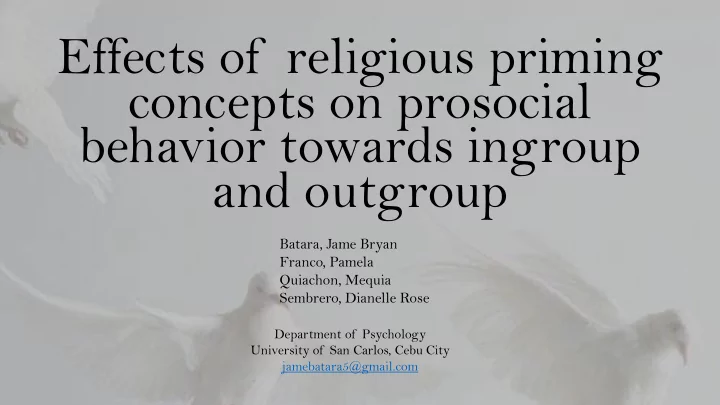

Effects of religious priming concepts on prosocial behavior towards ingroup and outgroup Batara, Jame Bryan Franco, Pamela Quiachon, Mequia Sembrero, Dianelle Rose Department of Psychology University of San Carlos, Cebu City jamebatara5@gmail.com
Prosocial Behavior • a descriptive term that refers to behaviors as acts that benefits others although costly to oneself ( Eisenberg, Fabes, & Spinrad, 2007 ). Priming • activating related conceptual representations in an individual’s memory which can lead to thinking and behaviors in line with such activated representations (Bargh, Chert, & Burrows, 1996) Social Categorization • ingroup (as opposed to outgroup) refers to a group wherein an individual shares similarities with the members and these similarities may be based on kin, being friends, similar values, and beliefs among others (Triandis, 1994)
What the literature says… • Growing studies have found a positive link between religiosity and prosocial behavior (for recent reviews, see Oviedo, 2015 and Saroglou, 2013). • Experimental investigations through priming religious contexts and concepts have led to mixed results (for recent review, see Shariff, Willard, Andersen, & Norenzayan, 2016). • It has also been found that religion is consistently linked to prosocial behavior towards ingroup compared to outgroup (minimal prosociality; Saroglou, 2013). • Ritter and Preston (2013) suggested that the three different religion- related primes (agent, spiritual, institutional) may lead to different levels of prosocial behavior.
Religious Priming Concepts Agent Prime Spiritual Prime Institutional Prime Social categorization of the target of prosocial behavior Ingroup Outgroup
Religious Primes
Social categorization of the target of prosocial behavior
video Cover Story Debriefing
Religious Priming Concepts showed significant effect towards prosocial behavior whereas Social Category of the target of prosocial behavior did not. Spiritual prime showed the most effect in increasing prosocial behavior.
Priming concepts differ in their influence towards prosocial behavior Spiritual primes elicited the most prosocial behavior than other primes. • In construal level theory, abstract thinking and concrete thinking have different effects on the people’s cognition and behavior (Trope & Liberman, 2010) . • spiritual primes are believed to activate a person’s abstract thinking (Ritter & Preston (2013). • Abstract thinking led Christians to exhibit less prejudice towards outgroup (Luguri, Napier & Dovidio, 2012).
Regardless of who is in need, participants were still willing to help. • Filipino respondents were willing to help regardless of the social categorization of the target (Batara, 2015) . • In Kapwa theory, Filipinos treat both close and distant others as part of their shared inner self and this somehow reflects in interacting with others (Enriquez, 1992). • It is not about maintaining smooth interpersonal relationship alone but Filipinos are most concerned with pakikipagkapwa or treating others as fellow (Clemente et al., 2008). • Maka-Diyos seems to be the central value of Kapwa (Clemente et al., 2008).
Thank you! Department of Psychology University of San Carlos, Cebu City jamebatara5@gmail.com Batara, J. B. L., Franco, P., Quiachon, M., & Sembrero, D. R. (in press). Effects of religious priming concepts on prosocial behavior towards ingroup and outgroup. Europe’s Journal of Psychology .
Recommend
More recommend